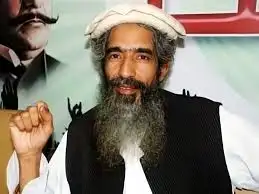Lashkar-e-Taiba Co-Founder Amir Hamza Injured in Lahore, Under Hospital Surveillance
Amir Hamza, a founding member of the banned terrorist group Lashkar-e-Taiba (LeT), suffered injuries at his home in Lahore and is currently receiving treatment in a private hospital under strict security. Known for his close ties to LeT chief Hafiz Muhammad Saeed and deputy Abdul Rehman Makki, Hamza now lies under medical supervision as speculation swirls around the cause of his injuries.

Witnesses reported unusual movement outside Hamza’s residence in central Lahore earlier this week. Security personnel quickly transported him to a nearby medical facility. While officials have not disclosed the nature of the injury, sources suggest the incident may have resulted from internal conflict, a targeted attack, or a domestic mishap.
A Key Figure in Lashkar-e-Taiba
For decades, Hamza played a critical role in shaping LeT’s ideological operations. He wrote religious tracts, delivered fiery sermons, and mobilized recruits through propaganda campaigns. Though less visible than figures like Hafiz Saeed or Makki, Hamza helped build the group’s radical foundation.
Lashkar-e-Taiba, though officially banned in Pakistan, continues to operate under various aliases. The group is responsible for several deadly attacks, including the 2008 Mumbai siege that killed over 160 people. Several international agencies, including the United Nations and the U.S. Treasury Department, have sanctioned its leadership. Yet, Pakistan’s enforcement of those sanctions remains under scrutiny.
Hospital Security Raises Eyebrows
The hospital where Hamza currently stays has become a high-security zone. Armed officers, both in uniform and civilian attire, control access to his ward. Hospital staff refused to share any medical updates, citing national security concerns.
Security experts believe this response indicates either the high-profile nature of Hamza’s injury or fears of an assassination attempt. Some analysts suggest that LeT’s internal divisions may be deepening, leading to power struggles behind closed doors.
In recent years, similar cases involving militant leaders have surfaced. Several of them either disappeared from public view or died under mysterious circumstances. Observers now question whether the Pakistani state has shifted its approach towards militant groups it once tolerated.
Longstanding Ties with LeT Leadership
Amir Hamza’s influence within LeT stretches back to its formative years. He worked closely with Hafiz Saeed, who still remains the group’s symbolic head despite multiple arrests. Abdul Rehman Makki, Saeed’s brother-in-law and a top LeT strategist, also maintained a close working relationship with Hamza.
Together, this trio shaped LeT’s recruitment, financing, and operational plans, particularly in Punjab and Kashmir. Hamza often acted as the ideological bridge between senior leadership and grassroots followers. His sermons and publications inspired thousands, helping LeT expand its influence across South Asia.
Although he avoided the media spotlight, intelligence officials in India and Western countries tracked Hamza for years. They considered him a dangerous propagandist who contributed to radicalization efforts across the region.
Government Maintains Silence
So far, Pakistani authorities have avoided commenting on Hamza’s condition or the reason behind his hospitalization. The Ministry of Interior, Punjab Police, and military spokespersons have all declined to release any official statements.
This silence has raised questions. Why would the government keep such an incident under wraps, especially when international agencies closely monitor LeT’s leadership? Some believe officials want to avoid triggering diplomatic fallout, especially with India, which frequently criticizes Pakistan for harboring terrorists.
Earlier this year, Pakistan avoided re-entry into the Financial Action Task Force (FATF) grey list by pledging stronger action against terrorist financing. A visible crackdown on someone like Hamza might bolster Islamabad’s global image—but mishandling the narrative could create the opposite effect.
India Likely to Watch Closely
India has yet to respond publicly to reports of Hamza’s injury. However, security agencies there are likely monitoring the situation. New Delhi considers Hamza, Saeed, and Makki part of a network responsible for countless attacks inside Indian territory.
Indian officials have long argued that Pakistan selectively targets terrorists—pressuring some while protecting others. If Hamza’s injury signals a genuine shift in Islamabad’s policy, it could open a new chapter in counter-terrorism efforts. If not, it may simply reflect internal disputes or health-related issues being swept under the rug.
Possible Fallout for Lashkar-e-Taiba
Hamza’s absence could impact LeT’s internal stability. Though the group still operates through fronts like Jamaat-ud-Dawa and Falah-e-Insaniyat Foundation, its leadership remains under constant pressure. International sanctions, domestic intelligence scrutiny, and growing internal challenges have weakened the group’s grip.
Observers believe a power vacuum may emerge if Hamza’s condition deteriorates or if he withdraws from active leadership. That could prompt shifts in the organization’s command structure or create rival factions vying for influence.
Additionally, Hamza’s ideological contributions left a lasting imprint on LeT’s rank and file. His sudden hospitalization might lower morale among followers, particularly those in Punjab and Kashmir who revered him as a religious authority.
The Bigger Picture
Amir Hamza’s injury brings Lashkar-e-Taiba and its leadership back into focus at a time when Pakistan faces mounting pressure to dismantle extremist networks. Whether his injury was an accident, a sign of internal conflict, or part of a broader state strategy remains unclear.
However, one thing is certain: Hamza’s role in the organization has made him a person of interest not just in Pakistan, but across the globe. His condition and the government’s response could offer important clues about the future of terrorism in South Asia.
As more information unfolds, the world will watch closely—hoping for transparency, accountability, and perhaps, a meaningful shift in Pakistan’s long-standing approach to extremist groups.






